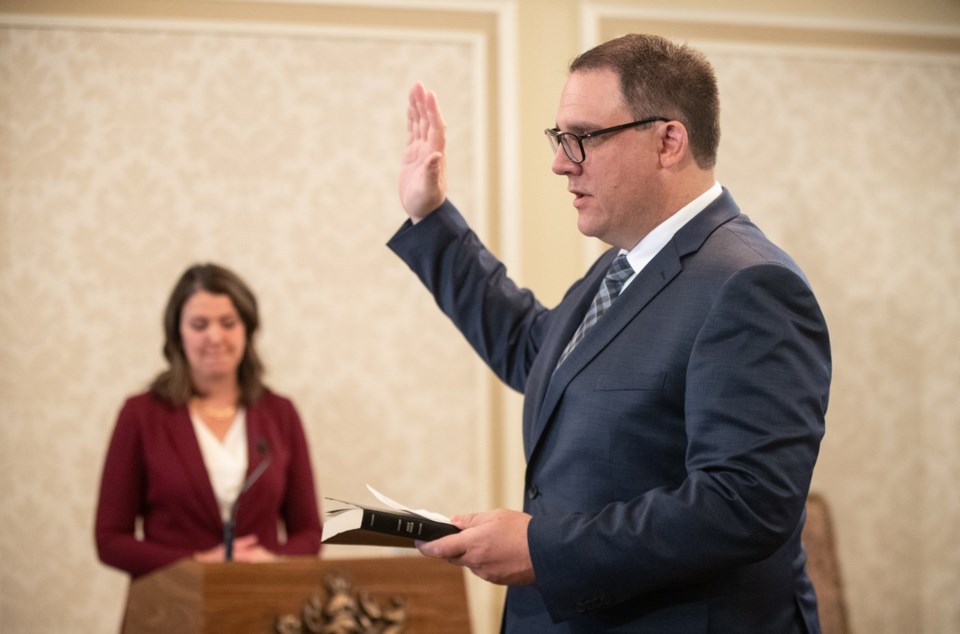EDMONTON — Another disability advocacy organization says its funding has been cut by the Alberta government.
Trish Bowman, chief executive of Inclusion Alberta, said Wednesday the government informed her earlier this month it was cutting some of the grant funding that the group has received for decades.
She said the cut totals more than $500,000 for the upcoming fiscal year, and it comes halfway through Inclusion Alberta's two-year government contract for the grant.
"This will absolutely have an impact, a long-term impact, on the supports and services that we're able to provide," Bowman said.
"We're going to do our very best to try to ensure that we're still able to support individuals and families across the province, but there will absolutely have to be some changes in what we're able to do."
Ashley Stevenson, press secretary for Community and Social Services Minister Jason Nixon, said in an email that Inclusion Alberta wasn't providing direct services with the grant funding, which it was supposed to be for.
She said the agency would still receive about $10.3 million for services it does provide. Inclusion Alberta spokesperson Sara Protosaw said that figure is for two years.
"Alberta’s government is ensuring that resources are allocated directly to connecting individuals and families to supports and services as quickly as possible," Stevenson said.
"The contracts being concluded are for funding that does not provide direct front-line services to persons with disabilities, and no front-line services are affected by this decision."
Bowman said Inclusion Alberta was using the cut funding to provide services, including peer support programs for families of children with intellectual disabilities as well as help navigating government systems.
"These are, in our opinion, really direct supports to individuals and families to create the best life possible they can for their family member," Bowman said.
"Those navigational and educational supports are really critical and really direct to providing opportunities for individuals to have a rich life."
Earlier this month, three other disability advocacy organizations announced they were also losing provincial funding after the government determined they weren't providing direct services.
The Self Advocacy Federation in Edmonton, the Disability Action Hall in Calgary and the Southern Alberta Individualized Planning Association in Lethbridge said they were informed the government was ending their three-year funding contracts a year early.
Keri McEachern, a facilitator with the Self Advocacy Federation, said at the time that the organizations received just under $425,000 per year combined from the government.
The groups and more than a dozen clients said they disagreed with the province's services assessment, as they provided a network of peers and access to educational opportunities.
Bowman said she's deeply concerned with what appears to be a trend of funding cuts to disability organizations.
"We all recognize that these are uncertain times, but these are the people who can least afford to be further impacted and marginalized by the lack of support," she said.
Marie Renaud, the Opposition NDP's community services critic, said the United Conservative Party government was "systematically eliminating the adjacent supports for people with disabilities."
"It's kind of a cut off your nose to spite your face situation," she said. "The adjacent supports ... are actually supports that help people or support people while they're lingering on these really ridiculously long wait-lists."
On Monday, Inclusion Alberta published two reports analyzing surveys it undertook to see how two key government programs for supporting Albertans with intellectual disabilities were being received by those who access, or try to access, the programs.
Persons with Developmental Disabilities and Family Supports for Children with Disabilities provide eligible Albertans with a caseworker and access to supports ranging from financial assistance to caregiving support at home.
The surveys suggest people were waiting months and sometimes years to find out if they were approved. If they were approved, many said they waited for at least a year to receive supports.
Close to 200 respondents said they were receiving supports but not ones they actually needed.
Renaud said systemic issues like those in the reports illustrate the need for advocacy organizations.
"I have no doubt that these cuts and whatever else is coming is going to make the problem that we have in front of us exponentially worse," Renaud said.
Keltie Marshall, a parent of children with disabilities and a co-founder of Hold My Hand AB, a children-focused disability advocacy organization, said the cut to Inclusion Alberta is especially detrimental given the need for navigation support.
"I think our kids are always cut from first," Marshall said.
"Our kids are not a priority and their supports are not a priority, and people who advocate for them are not a priority."
When asked about the surveys, Stevenson said the government is working to modernize Persons with Developmental Disabilities and Family Supports for Children with Disabilities.
"Alberta’s growing population, coupled with an increase in the prevalence of disability, has put increased pressure on these programs to keep pace," she said.
"This is why the department is working to modernize these programs to ensure it continues to work for Albertans now and in the future."
She said the government budgeted about $1.45 billion for both programs in the 2024-25 budget.
This report by The Canadian Press was first published Jan. 22, 2025.
Jack Farrell, The Canadian Press


